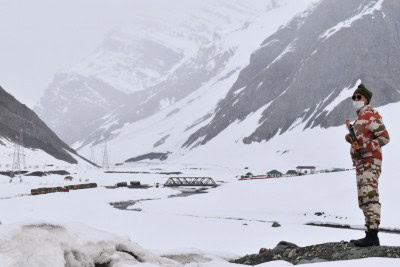By Aarti Tikoo Singh
Leh/New Delhi, Aug 2 : Unlike every other summer when the bazaars are teeming with tourists, this season, due to the coronavirus pandemic, life in Leh, is placid. Yet as the sharp sun shines on the rugged mountains of the high-altitude desert of Ladakh, natives step out wearing masks and hope. Reason — Ladakh is happy with its union territory status.
On August 5 last year, the central government carved out two union territories — Ladakh and Jammu & Kashmir (J&K), out of the state of J&K.
The union territory of Ladakh had been a long pending demand of the Ladakhi people. The agitation for the demand had begun under Ladakh’s greatest leader Kushok Bakula, 65 years ago and later carried forward by another Ladakhi leader Thupstan Chhewang. Both represented Ladakh in Indian Parliament.
“None of us had ever imagined that the demand would be met in our lifetime. In six decades no Prime Minister could do it when Prime Minister Narendra Modi last year, in his second tenure, made the announcement, we could not believe our ears,” Tashi Norbu, a cab driver in Leh said.
Even as tourism “the sector on which a huge section of Ladakhis are dependent economically” been hit due to coronavirus pandemic, common people in markets which are partially closed, are brimming with hope. “Ladakh and Ladakhis are finally going to shape their own future and have their own identity, independent of Jammu & Kashmir,” Stanzin, a seller of organic produce in Leh said.
Putting the constitutional change in perspective, the Chief Executive Officer (CEO) of the Leh Autonomous Hill Development Council (LAHDC), Gyal P. Wangyal pointed out how Jammu and Kashmir state used to draw funds from the central government in the name of Ladakh’s geographical area of 45,000 sq km, which was 65 percent of J&K, but granted only two per cent of the allotted budget to Ladakh because the state government would distribute the resources on the basis of population.
Last year, the budget for Ladakh was Rs 57 crore. The budget today is four times of the last year’s — Rs 232 crore. Ladakh got Rs 6000 crore budget as a special development package. “But unfortunately, covid-19 pandemic happened which has set us behind by three years because we could not hold the meeting to approve the budget in the council,” Wangyal who has been the CEO of LAHDC for the last one year, said.
“J&K was already established, but we are starting from zero. It will take time, another two to three years. Ladakh’s future will depend on it,” Wangyal said. The union territory is headed by Lieutenant Governor R.K. Mathur and a team of his advisors and officials who work closely with the 30 members of LAHDC.
S.S. Khandare, Inspector General of Police (IGP), a post that has been created for the first time in Ladakh substantiated the same view further, “Ladakh’s police infrastructure was very poor before the formation of UT. Now we are ramping up. Ladakhis who served in J&K police have been sent back to Ladakh and posted here in their own police now. Ladakh police has acquired its own identity. We are purchasing modern gadgetry.”
Ladakh Buddhist Association (LBA), the largest socio-political organization of Ladakh, has been grateful to the central government for fulfilling its demand for union territory status. “But the biggest challenges ahead are related to employment, environment and land. Ladakhis want some protection in all three areas. We are hopeful that the government will address our concerns,” President of LBA P.T. Kunzang said.
Even the opposition party, Congress which runs municipality in Leh is cheerful and optimistic about Ladakh’s future as a union territory. President of Municipal Committee Leh, Ishey Namgail told IANS that the change process has just begun with the “elevation of two districts of Leh and Kargil to union territory had elevated the profile of the region. He said he was very confident that it will further make Ladakh a top international tourist destination.
In Leh’s newly-built government offices which came up soon after the decision, even as strong fragrance of fresh paint hasn’t faded and the dust of the gravel in the premises hasn’t settled, officials stay up late nights to hold meetings and clear the files which contain the blueprint of Ladakh as a union territory.
“We have lost a lot of time because of the coronavirus pandemic and we have a lot to accomplish in the months ahead,” a young officer who did not want to be quoted said.
–IANS
aat/skp/

